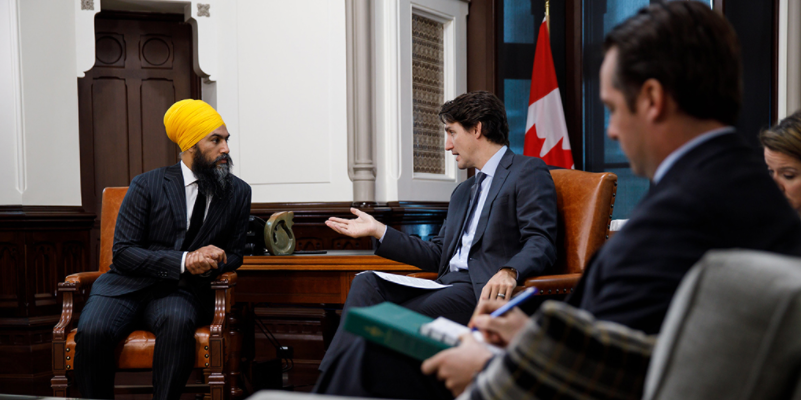The Liberal-NDP “Delivering for Canadians Now” speaks about “reconciliation” but does not address the continued colonization of unceded territories with megaprojects built with police protection, nor the carceral state infrastructure that increasingly imprisons Indigenous peoples.
The 2021-22 main estimates (budget) allocate more than $3.4 billion to the Royal Canadian Mounted Police (RCMP).
We have seen this police force criminalize and arrest Indigenous land defenders opposed to pipelines being built on their lands.
This includes the TC Energy Coastal GasLink fracked gas pipeline on Wet’suwet’en territory, where 74 land defenders, journalists and legal observers have been arrested in three militarized RCMP raids over the past three years.
It also includes the Government of Canada-owned Trans Mountain tar sands pipeline now being built on Secwepemc territory to move 890,000 barrel of oil per day for decades to come.
And while we learned last month that the construction of that pipeline is now expected to cost $21.4 billion (up from the original estimate of $7.4 billion just four years ago), the Liberal-NDP agreement is silent on this multi-billion dollar infringement of Indigenous sovereignty.
During the federal election last August, Singh, who has said he opposes the expansion of the pipeline, commented: “Once we form government, we’ll look at the asset and make the best determination on what to do moving forward.”
It would appear this assessment has been made.
Mi’kmaq lawyer Pam Palmater has commented: “The only way we are ever going to stop RCMP racism and brutality against Indigenous peoples is to declassify, deconstruct and defund the institution itself.”
Even just one additional line in the agreement could have started that process by defunding the Community-Industry Response Group (C-IRG), the RCMP’s resource extraction protection unit seen on these territories.
An expansion of the carceral state
The Liberal-NDP agreement is also silent on the issue of the expanding carceral state for Indigenous peoples.
In 2015, the federal Truth and Reconciliation Commission recommended:
“We call upon federal, provincial, and territorial governments to commit to eliminating the overrepresentation of Aboriginal people in custody over the next decade, and to issue detailed annual reports that monitor and evaluate progress in doing so.”
In 2015-16, there were 333,196 admissions to provincial, territorial and federal correctional services. Indigenous adults accounted for 86,933 of those admissions. By 2018/19, the total number of admissions had increased to 383,369, with Indigenous adults accounting for 118,565 of those admissions.
The budget deal between the Liberals and NDP does not speak to this situation of the expanding carceral state for Indigenous peoples.
In fact, it continues to spend billions of dollars to perpetuate it. The 2021/-2 budget for Correctional Services Canada is about $2.8 billion.
Seven years ago, both parties endorsed the recommendations of the Commission.
The Liberals said: “It is time to act, without delay. Meaningful reconciliation will only come when we live up to our past promises.”
And the NDP added: “We are extending a hand and we commit to working with the government in partnership with Indigenous Peoples to ensure that the recommendations are implemented in a good way.”
That promise remains unfulfilled.
More spending on the military
The Liberal-NDP budget deal could also mean about $18 billion more a year spent on the military (bringing that annual budget to about $41.6 billion.
When asked about this, NDP leader Jagmeet Singh said his party would not block this spending hike provided it does not come at the expense of the new spending promised in health and dental care in the agreement.
A massive military budget in Canada could also lead to a further militarization of police forces as has been seen in the United States where over $7 billion of excess military equipment has been disbursed to local police departments.
Lastly, let us look at the militarization of the border.
The Transnational Institute recently reported that Canada spent an average of $1.9 billion a year (over the years 2013-18) on the militarization of its borders while only contributing $149 million a year over the same period on climate financing to mitigate the impacts of climate change that drive forced migration.
The 2021-22 budget for the Canada Border Services Agency is $2.05 billion.
Those advocating for just transition principles need to speak to this.
We can celebrate that the right to health may very well be advanced by the Liberal-NDP agreement that could optimally see $16.5 billion spent annually on dental care and pharmacare. It will also hopefully put funds into other needed social programs. But when billions more are spent on policing, prisons, the military and borders, we do need to question on balance what this agreement really delivers.



